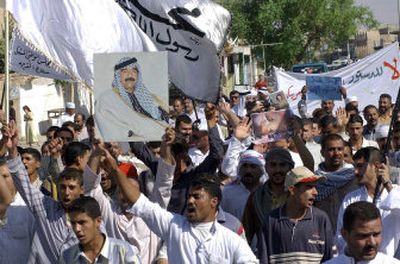Sunnis face charter dilemma

BAGHDAD, Iraq – Rebuffed in the constitution deliberations, Sunni Arabs now face a dilemma: Boycott the Oct. 15 referendum on a new charter and hand the Shiites a landslide victory, or take part in a vote that demographics suggest they’ll lose.
But the Shiite community itself is divided over the constitution, and interviews on Baghdad streets indicate the key federalism proposal may be a hard sell to many on both sides.
About 2,000 people, mostly Sunnis, marched Monday against the constitution in Saddam Hussein’s hometown of Tikrit. Some carried pictures of Saddam and repeated chants heard in countless stage-managed protests during his regime: “We sacrifice our souls and blood for you, Saddam.”
Others carried pictures of radical Shiite clerics Muqtada al-Sadr and Jawad al-Khalisi, who have joined the Sunnis in opposing the constitutional draft because of federalism – which critics fear will lead to the disintegration of Iraq.
In Tal Afar, an insurgent-ridden city in northern Iraq with a volatile ethnic mix, a U.S. Army helicopter made a forced landing Monday night under hostile fire, and one soldier was killed and another injured, the U.S. military said. No further details were released.
It seems unlikely that mainstream Sunni Arab leaders will launch an organized campaign to keep Sunnis from the October polls, but their refusal to endorse the constitution was a major setback for the U.S. strategy to lure militant Sunnis away from the insurgency and hasten the day U.S. troops can go home.
The Jan. 30 boycott was widely perceived by Sunnis as a disaster, handing control of the 275-member National Assembly to Shiites and Kurds. The Shiite-Kurd alliance then pushed through demands for federated mini-states and set the legal foundation for purging thousands of Sunni Arabs from government jobs because of past membership in Saddam’s Baath Party.
Instead, Sunni Arabs are urging followers to register by the Thursday deadline and reject the constitution in the referendum. Voter registration in the Sunni stronghold of Anbar province was extended for a week so more people could sign up.
The very Sunni clerics who railed last January against an election “under foreign military occupation” are now urging their people to take part in both the referendum and the parliamentary balloting in December.
Demographics are a big problem for the Sunni Arabs – an estimated 20 percent of Iraq’s 27 million people.
Sunni Arabs form the majority in four of the 18 provinces, but their numbers are overwhelming in only two, Anbar and Salahuddin. Under a quirky election rule, a “no” vote by a two-thirds majority in any three provinces would defeat the referendum.
The three-province veto was a concession to the Kurds during negotiations for the March 2004 interim constitution, which remains in effect until the new charter is ratified. Now, it’s the Sunnis’ best card.
In many areas, the Sunni majority may not reach two-thirds. Each of the Sunni-dominated provinces contains substantial Shiite and Kurdish communities. With no minimum turnout required, a few Shiite and Kurdish voters approving the constitution would be enough to swing a province to the “yes” camp – unless Sunni Arabs turn out in force and the other groups are intimidated to stay home.
To broaden their base, hardline Sunni clerics have made overtures to radical Shiite preachers such as al-Sadr, who enjoys considerable support in parts of Baghdad, in cities such as Tal Afar in mostly Sunni Ninevah province, and in the Shiite south.
The bridge issue between the two sides has become federalism, a concept many Iraqis outside of the Kurdish region do not fully understand. Many ordinary Iraqis are unfamiliar with the details of the constitutional debate because while TV coverage has improved, an electricity shortage prevents people from seeing it.
As a result, in a country with a tradition of central rule and the notion of Arab unity held sacred, federalism has become a code word for the breakup of Iraq. That has resonance in a population that has seen three wars in the past 24 years.
“I agree with what’s in the draft constitution,” said Hazim Kadim, 24, an east Baghdad student. But language about federalism and differences among Iraqis make him uncomfortable.
“This makes us feel that there is some kind of division,” he said.
Qais Yassin Moussa, 40, a Shiite technician in a Baghdad suburb, said he liked most of the constitution except for federalism “because we are not fully acquainted with federalism.”
“Maybe we can talk about federalism in the future,” he said. “We fear it might lead to division.”
Opinions among Sunnis were stronger.
“We absolutely refused this draft because it was imported from abroad,” said Abdul-Qader Izzadine, a 40-year-old businessman. “All the people who wrote this draft were exiles who came from abroad. They want to divide Iraq and carry on their conspiracy.”
Saad Jawad Kadim, 50, a Sunni high school teacher, said “the American administration imposed this constitution” because “America wants to divide Iraq into regions” to “destroy the Iraqi identity.”
To guarantee a big turnout, local Sunni leaders also need tacit support from Sunni insurgents. Last January, insurgent threats to attack polling stations kept many people at home. Only a massive U.S. and Iraqi security operation prevented widespread violence.
But the insurgents themselves are divided. While all groups have rejected elections under foreign occupation, some are believed amenable to softening that position if asked by clerics and other Sunni leaders.